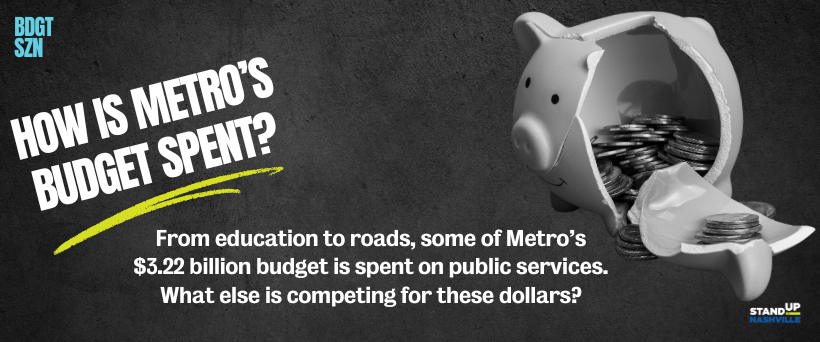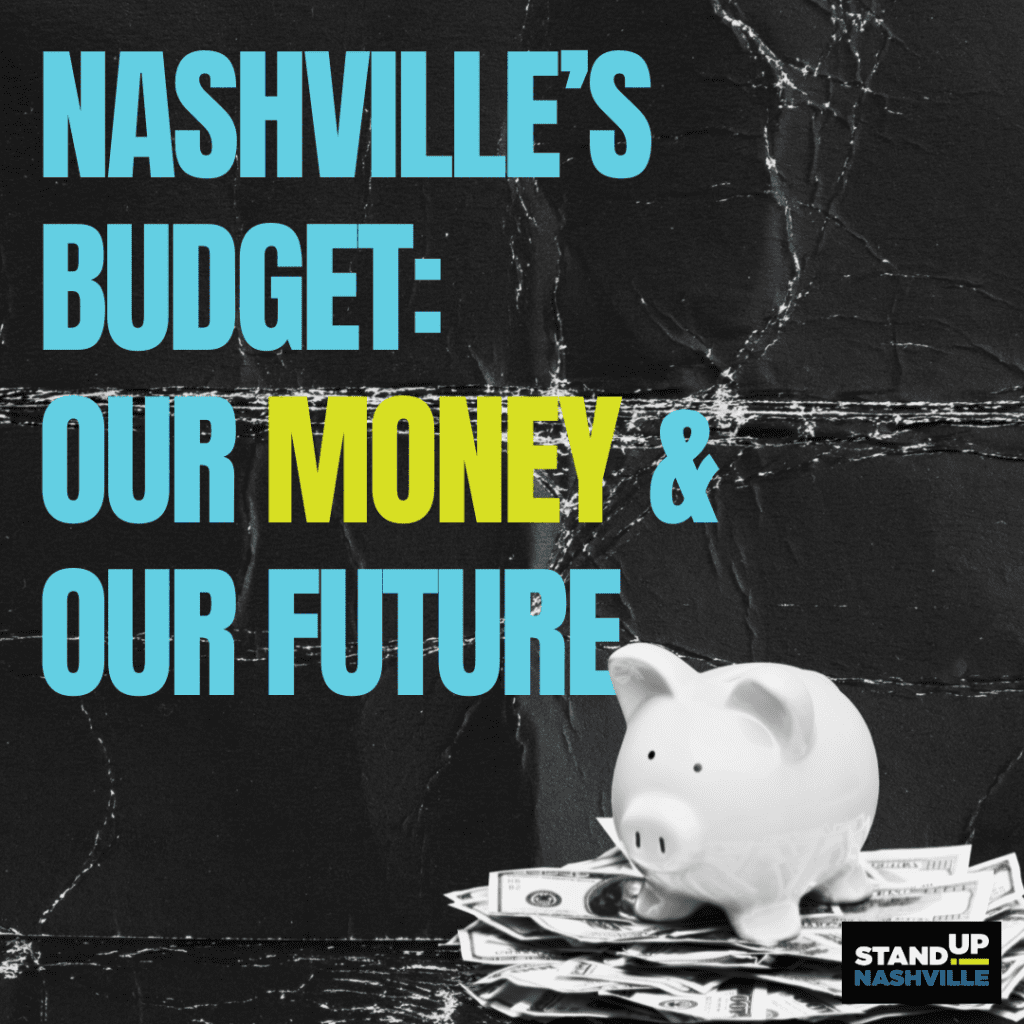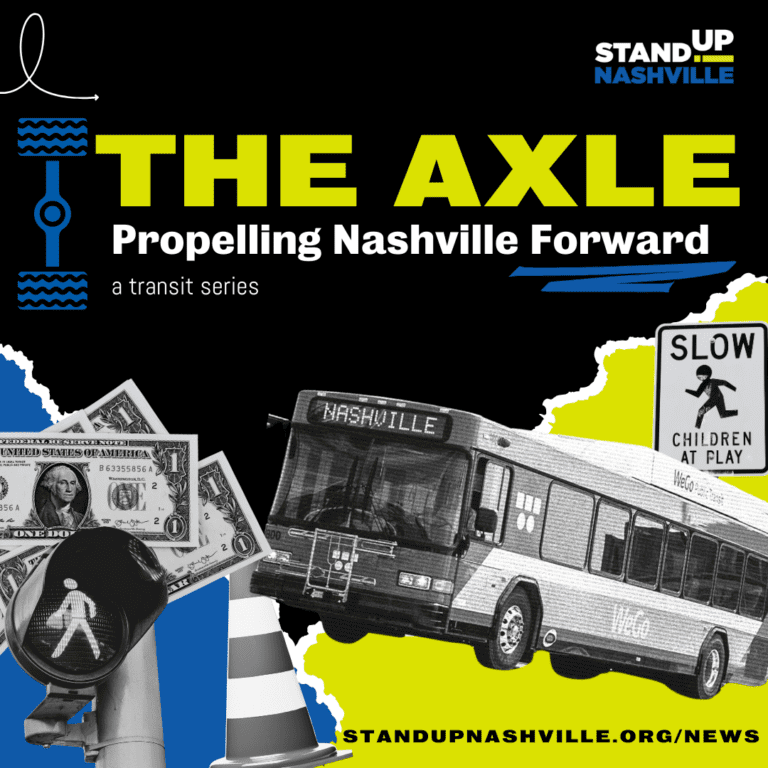We’re back with another round of budget news!
Let’s start with a summary of what we’ve covered so far. If you prefer the scenic route, you can read the previous issues in their entirety.
- Part 1 introduced what the budget is, the timeline, key terms, who is involved, and why it should matter to Nashville residents. Similar to your personal budget, the city is also responsible for stewarding its finances. And as residents, you have a right to have a say.
- Part 2 dug into the billions of dollars allotted in the budget. Yes, $3.22 billion to be exact. We broke down how the city receives money (a.k.a. revenue) through property tax, sales tax, and grants and contributions. Then, we discussed how money flows out (a.k.a. expenditures) through education, infrastructure, transportation, and more.
- Part 3 explained how the Metro Nashville charter designates most budget responsibilities and power to the mayor. However, Metro Council still has a say and weighs in on the crucial coin-counting. We also highlighted the other people, organizations, and businesses that want a piece of the budget pie.
In part 3, we presented the concept of the 1%. No, not the few folks who hold the world’s wealth under their thumb. We’re talking about the less than 1% of changes that the council can propose for the budget. Because there’s not a lot of room to switch things up, the next consideration could be…*whispers* raising taxes.
Yes, we said it, but hear us out. We know that not many people are in favor of their taxes increasing. However, we must keep in mind the whole picture when thinking of the budget. To be crystal clear, Stand Up Nashville is on the side of building economic livability and power for our city’s working class residents of all backgrounds.
The majority of residents aren’t wishing, hoping, or asking for a tax increase. But the reality is that taxpaying, working community members need the city to create more public revenue streams. Before we jump into the why, let’s level set by addressing the following:
- Tax increases are a political issue.
- Tax increases have a financial reality.
Politics, again?!
Tax increases are political because they ask fundamentally political questions: “What services do we all want?” and “How do we pay for them?”
It’s often stated as a debate between those who want big government vs. those who want low taxes. Despite the jargon and media spins, it isn’t that simple. Especially when our research and that of other reputable organizations indicate that, regardless of socioeconomic status, Nashville’s residents desire similar key things. The top issues include funding public schools, maintaining roads and infrastructure, creating safer communities, and paying public employees a suitable, living wage.
Tax increases are political because of the lack of public trust in elected officials and their decisions. We see how the state legislature continues to overreach into areas that impact our daily lives. For example, they’ve passed laws that prohibit cities from exclusively taxing big corporations and developers. In Nashville, we are only allowed to increase property or sales taxes. Although a shift has ushered in elected officials who prioritize what the overwhelming majority of people want, the distrust is real and warranted. After all, the Titans stadium debate demonstrated how powerful special interests still hold a lot of sway. This only makes residents more skeptical when they hear talk of raising taxes, even if it’s needed.
Because Stand Up Nashville understands the political bend of what it means to raise taxes, we remain resolute in our refusal to pit working class neighbors against one another. The purpose of this budget series is to help community members like you understand the process and take action to ensure your hard earned money goes toward public good. The conversation shouldn’t stand on “Should we pay more or less in taxes?” Instead, we must champion the question “Who is paying their fair share, and who does it benefit?”


The city’s financial reality
Tax increases allow the city to have more revenue to meet more of the needs of the public. However, the concept of raising taxes doesn’t have to mean raising them. Huh? Yes. Take a deep breath and we’ll explain.
The average person’s understanding of raising taxes is that the tax rate they are now paying is more than what they previously paid. However, it’s not that basic. Yes, oversimplification again. When we say “raise taxes,” it’s really the concept that the tax rate needs to be adjusted and here’s why:
- Property tax reappraisals
You’re probably wondering, “Why does the tax rate change in the first place?” Well, for most years, property taxes aren’t actually raised. In fact, state law forces the tax rate to be decreased some years due to the revenue neutral requirement. The revenue neutral requirement protects taxpayers against automatic and arbitrary increases to their tax bills after an appraisal.
Because of this, Metro’s property tax revenues mostly stay the same year to year. While sales tax revenues can vary greatly, there are only slight increases in property tax revenues from newly built properties. Individual taxpayers only see a change in their tax bill in two scenarios: following a reappraisal year or when the tax rate is changed.
In Metro Nashville, the reappraisal process happens every four years. The tax rate changes based upon how much property values have changed and how much new revenue city leaders believe is needed to meet the public needs. We will break down the reappraisal process and its impact on the budget in greater detail in the next issue. Just know that sometimes people end up paying more or less in property taxes even as the rate goes up. It’s complicated.
- Government costs go up with inflation, too
Just as you see and feel the impact of inflation at the grocery store, in rent and mortgages, and in interest rates, the government experiences it too. The costs of department labor, contracts, materials, and more decrease the actual amount of money in the budget to maintain the existing services, let alone expand them.
- Metro Nashville – Davidson County has the lowest property taxes of the state’s big cities
According to the FY2025 Metro Operating Budget Book (p. 29), this year’s rate of $3.25 is tied for the third lowest in Metro’s history. Meanwhile, property taxes in Chattanooga – Hamilton County are $4.49, Knoxville – Knox County are $3.71, and Memphis – Shelby County are $6.09.
The rate is $3.25 per $100 of a property’s assessed value, which is the portion of the appraised value which is taxable.
- Our taxes and revenues are very low in comparison to peer cities in the nation
A 2020 study by the Nashville Chamber found that expenses have outpaced revenues from 2010 to 2019. This leads to the abysmal reality of not having enough money for critical services, which of course, makes it more difficult to address the voiced desires of residents. Before 2019, financial mismanagement and lack of savings forced Metro to overly rely on cash reserves in the Fund Balance.
In 2019, the State Comptroller took over Metro finances. Eventually, Metro adopted a new Fund Balance policy in January of 2023 that requires higher minimum savings in the budget each year. It also restricts what the balance can be used toward in the operational budget. Thankfully, the city has a lot more savings now that can be used in the event of an economic crisis. Unfortunately, it also means that there’s less flexibility to fund operating costs for trash pickup and employee pay.
Now you see why it is less of raising taxes and more of adjusting taxes. By routinely adjusting the property tax rate, we can maintain pace with the growth in property values and inflation costs. If we don’t allow routine adjustment, we’ll continue to experience the negative impact of underfunded departments, inconsistent services, and crumbling infrastructure.
We want to hear from you
Please share your thoughts about adjusting taxes and the benefit it could have for Metro Nashville and Davidson County residents. What’s something you’ll share with your neighbors, friends, and community members?







